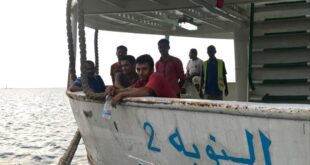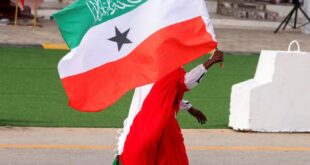Perhaps in an effort to signal an opening for negotiations, Al-Qaeda’s branch in the Sahel declared that French soil is not part of the conflict.
For the first time, an al-Qaeda affiliate publicly declared that the ongoing war with France does not include French soil.
The most active branches of al-Qaeda and the so-called Islamic State (IS) are currently in sub-Saharan Africa.
Negotiations are a necessary tool that can and should be utilized in parallel with military action to deliver sustainable solutions.
With Africa becoming the epicenter of jihadist activity globally, al-Qaeda in the Islamic Maghreb’s (AQIM) Sahel affiliate, Jamaat Nusrat al-Islam wal Muslimin (JNIM), has continued to evolve into a political and military force in the region. The most active branches of both al-Qaeda and the Islamic State are in Africa — the Sahel region and the Horn of Africa for al-Qaeda, and the Lake Chad region and Central Africa for Islamic State. Until now, every al-Qaeda “governance” experience has resulted in failure, primarily due to military pressure by Western powers, quixotic objectives, internal rivalries, and a lack of political experience or maneuverability in addressing both the needs and grievances of local populations. Such was the case during the short-lived governance project in northern Mali in 2012. Al-Qaeda militants and local commanders implemented harsh interpretations of Sharia law, employed violence to enforce their authority, and destroyed cultural artifcats like the historic Timbuktu mausoleums. However, this contradicted the will of AQIM leader Abu Moussaab Abdel Wadud. To win hearts and minds, he ordered the militants under his command to follow a “soft gradual approach,” which received criticism from al-Qaeda central. To al-Qaeda’s senior leaders, Abu Moussaab was seen as too conciliatory and overly political.
Five years later, the same man was behind the effort that prompted the unification of four jihadist factions in the Sahel. Abu Moussab succeeded in mediating disputes between several regional commanders and at the same time, reinvigorated a weakened AQIM in Algeria through a vital push further south into Mali; JNIM was created under the banner of AQIM in 2017. However, in June 2020, French Special Operations forces killed Abu Moussaab in a firefight in northern Mali. AQIM is now headed by Abu Ubaïda Yussef al-Anabi, another Algerian national and former head of AQIM’s “Council of Notables” since 2010. He was the source of inspiration for Abu Moussaab’s approach, attempting “soft” governance and entrenchment in local dynamics. Such policies have been followed and implemented by the head of JNIM, Iyad Ag Ghali, a known Tuareg figure and a Malian politician before he became a jihadist leader. Second in command, Mohammad Kuffa, provides the group with reach into central Mali, Burkina Faso, and all the way to bordering Benin, Ivory Coast, Senegal, and Ghana, due to his ability to recruit among the Fulani community as a Fulani preacher. Consequently, the group has a reach beyond Tuareg and Arab recruits and the ability to disrupt the traditional social caste organization among the Fulani community.
Al-Qaeda tolerated the emergence of the Islamic State in the Sahel for almost four years, but this came to an end by 2020, prompting serious repercussions for civilians caught in the crossfire. This new reality of competition between groups in the region has translated into more committed recruits on both sides. Combined with the governance gap and lack of state services in many areas, the spillover of intra-group fighting is forcing local communities to seek protection from either JNIM or the Islamic State against attacks by the other group, predatory governmental security forces, or affiliated militias in the tri-border region (i.e. Mali, Niger, and Burkina Faso).
JNIM, which initially avoided publicly addressing the conflict with Islamic State, hinted in January 2021 at the latter’s responsibility for a massacre against the Zarma community in Niger and promised to avenge those killed. In Niger, for the first time in May 2021, the Islamic State claimed attacks against the local armed forces and militias as revenge for the killing of a number of Malian Tuareg by the Niger border forces. These claims highlight the Islamic State’s intentions to entrench itself in local dynamics in Niger.
Each group seems to express, or impose, its political will in rather opposite ways. JNIM has refrained from implementing harsh rule on local populations, and waited for locals to seek “Islamic justice,” even attempting to provide human resources in the field by calling upon non-affiliated local Islamic scholars to serve as a judge; meanwhile, the Islamic State has ruled by strict interpretations of Sharia, and often without any consideration for local dynamics. Another notable contradiction between the two groups emerged regarding western hostages. On the one hand, JNIM and AQIM both abduct and hold hostages because they possess the necessary logistical capabilities to do so. On the other hand, the Islamic State lacks similar detention capacities, and thus tends to execute captives on the spot. JNIM/AQIM currently holds six foreign hostages in the Sahel, among them an American and a French national. In comparison, the Islamic State executed six French humanitarian aid workers, their local guide, and their driver in Kouré Niger on the 9th of August 2020. This strategy suggests differing objectives—holding hostages can result in a financial payoff, while executing them immediately spreads terror and intimidates populations as well as foreign NGOs.
In a situation constantly in flux with multiple actors and interests, JNIM, the most powerful al-Qaeda affiliate, may be closing an international “terror chapter” on the soil of the continent where it all started. Africa witnessed the impact of al-Qaeda’s international network as early as 1998, with the embassy bombings in Kenya and Tanzania. The African continent was also the first to enter the open “jihadi governance” phase with the Union of Islamic Courts in Somalia. It was on African soil that the first U.S. soldiers died in a fight that included al-Qaeda returnees from Afghanistan as early as 1993 in the battle of Mogadishu. And it is in Africa that we are witnessing a notable evolution of one of al-Qaeda’s most active factions worldwide. For the first time an al-Qaeda affiliate or branch has publicly declared that the ongoing war with France does not include French soil. This came in the form of a written communiqué in January of this year. Six months later, the head of AQIM stressed in his first audio message in June that French soil was never targeted from Mali. At the same time calls to avenge the Prophet and to target French interests on the African continent continue. Nevertheless, this clear evolution in the speech of AQIM should be monitored closely and taken into consideration as it will certainly not put an end to the confrontation, but it could create an opening for talks in the future.
To counter the Sahel insurgencies, negotiations are a necessary tool that can and should be utilized hand in hand with military action and kinetic counterterrorism operations. JNIM, the only jihadi party willing to negotiate, uses terrorism and negotiations with governments and local representatives as tools and not as ends per se. However, even as the al-Qaeda affiliate softens its stance, France has been unable or unwilling to capitalize on this development and use negotiations as an effective tool with JNIM.
After eight years of direct French intervention, the status-quo in the Sahel is unsustainable. In the wake of a rising Islamic State and possible cooperation between its militants in the Sahel and Lake Chad, regional governments and international actors should not only engage JNIM militarily, but also politically as an actor deeply entrenched in local dynamics, enjoying popular support and acceptance. When local populations perceive jihadist factions as part of the solution to sustain their immediate daily basic needs, military action, improving governance, and accountability are not enough. Before addressing the Sahel issue as part of the Global War on Terror, Western powers should pressure local governments to address the whole power-sharing system and land attributions that should be reviewed on a targeted and local basis. Since jihadist groups capitalize and expound on local grievances, the solutions also exist on those same levels.
 Eurasia Press & News
Eurasia Press & News



